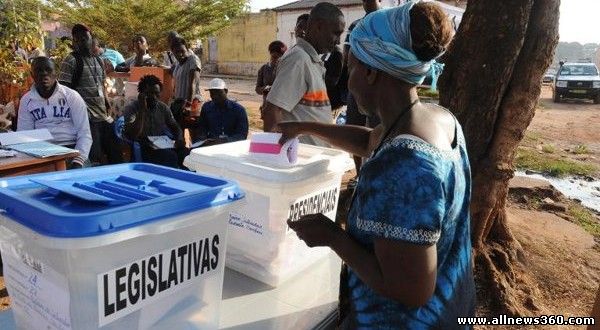 Voters in Guinea-Bissau began casting their ballots on Sunday in a presidential run-off election meant to draw a line under a 2012 military coup and renew cooperation between the chronically unstable West African nation and donors and investors.
Voters in Guinea-Bissau began casting their ballots on Sunday in a presidential run-off election meant to draw a line under a 2012 military coup and renew cooperation between the chronically unstable West African nation and donors and investors.
Former finance minister Jose Mario Vaz, candidate of the dominant African Party for the Independence of Guinea and Cape Verde (PAIGC), secured more than 40 percent of the vote in the first round and is considered the front runner.
He faces Nuno Gomes Nabiam, the former chair of Bissau’s civil aviation agency, who won around 25 percent of the first round vote, comes from the Balanta ethnic group – the country’s largest – and is seen as close to the army.
Large crowds lined up in front of polling stations in the capital Bissau. Over 775,000 voters, most of them young and voting for the first time, cast ballots in the first round.
“These elections will allow Guinea-Bissau to get out of the abyss,” said 40-year-old Maria de Fátima Almada Gomes, one of the first to vote after the polls opened at 3 a.m. EDT.
Guinea-Bissau’s last vote in 2012 was abandoned after soldiers under army chief Antonio Injai stormed the presidential palace just days before a scheduled run-off.
In his final speech ahead of the poll, Vaz called upon the country’s military to remain neutral this time.
“I am asking the army not to get mixed up in political matters and to remain in barracks,” Vaz told a rally of around 20,000 supporters gathered in National Heroes’ Square late on Friday. “I am also asking the people to forgive each other and for nobody to spread terror in our country.”
Weak state institutions, along with its array of islands and unpoliced mangrove creeks, have made the former Portuguese colony a paradise for smugglers of Latin American cocaine destined for Europe.
Since it won its independence in 1974, no elected leader has completed a five-year term in Guinea-Bissau and analysts say donors and regional powers who have been bankrolling the interim administration are frustrated with the recurrent crises.
SECURITY RISKS?
The final two weeks of campaigning in the country have mostly taken place in a peaceful, celebratory atmosphere.
Vaz campaigned on promises to reduce poverty and invest more in agriculture. Nabiam said he would focus on health, education and tackling youth unemployment.
“It’s the beginning of a new era that needs to be marked by radical change,” Nabiam told supporters during his final rally.
Edmundo Alfama, one of the early voters in Bissau, said the candidates’ promises of economic development would ring hollow unless they ended the country’s chronic cycle of instability.
“We must turn this black page of our history in order to finally decide upon a better future for our people, exhausted by so many years of political, economic and social crisis,” he told Reuters.
Both candidates have said they will accept the results whoever wins. But Dr Marie Gibert, an expert on Guinea-Bissau at Nottingham Trent University, remained skeptical.
“Much will depend on the reaction of their support bases. This is particularly true of the army if Vaz is declared the winner,” she told Reuters on Saturday.
Police sources said that around 5,000 men made up of police and forces drawn from the Economic Community of West African States regional bloc had been deployed since Friday to provide security until the results are announced.
They said the army had been forbidden from mobilizing on the day of the vote.
No major incidents were reported during the first round.
“I’m truly optimistic and serene,” Jose Ramos-Horta, U.N. Special Representative in Guinea-Bissau, said on Sunday. “The second round will be as peaceful, transparent and free.”
Source: Reuters
|

